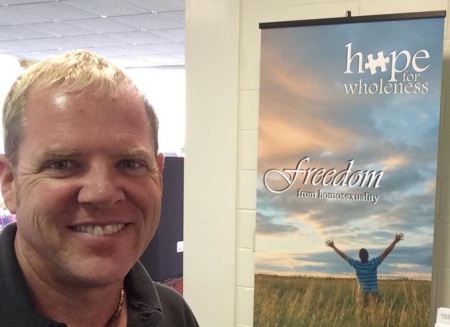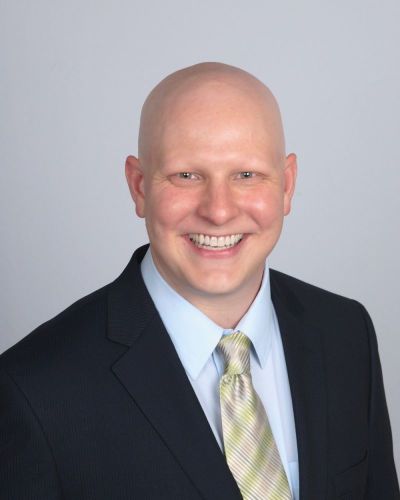McKrae Game is misguided in renouncing gay therapy ministry, ex-gay counselor says

A former homosexual and licensed professional counselor for those with unwanted same-sex attraction has responded to longtime conversion therapy practitioner, McKrae Game, renouncing sexual orientation change efforts therapy.
Game was dismissed from Hope for Wholeness in 2017 — a network that counsels people who want to leave their homosexual lifestyles behind — and in June had come out as gay, noting that while married to a woman he continued to be sexually attracted to men.
His story was featured in the The Post and Courier on Monday, and has since gained international attention for renouncing types of therapy aimed at helping people reduce or eliminate same-sex sexual attraction.
“Conversion therapy is not just a lie, but it’s very harmful,” Game told The Post and Courier. “Because it’s false advertising.”
Christopher Doyle, a counselor and the executive director of the Institute for Healthy Families, told The Christian Post on Wednesday that he had once met Game and, while considering him a “nice man,” believed he was “emotionally unhealthy.”
“As McKrae lamented in his recent apology, he was operating in a pseudo-counseling role with Hope for Wholeness and not properly trained to deal with the mental health issues of clients that struggle with sexual and gender identity conflicts,” Doyle said.
“Due to these and other problems, McKrae (admittedly) suffered from several nervous breakdowns and had an ongoing struggle with online pornography, which he used to medicate the stress of leadership. Undoubtedly, these factors led to his termination from Hope for Wholeness in 2017.”
In a statement to CP on Thursday, Hope for Wholeness said, in part:
“[McKrae Game’s] separation from the network was not an impulsive decision, but was decided after a full year of unresolved problems. This decision was one of the most difficult and painful we have ever made as a board.
“As to the practice of ‘conversion’ or ‘reparative’ therapy, HFWN and our affiliated ministries do not endorse or practice ‘conversion’ or ‘reparative’ therapies.
Most ministry leaders are not licensed therapists. We disciple individuals who are conflicted about their sexuality in regard to their faith. We utilize faith-based groups and pastoral discipleship to address issues from the individuals' past and help them reconcile their faith and sexuality.
We never use coercion, shaming, nudity, touch therapies with any individual who might come to our affiliate ministries. We believe in, and respect, the self-determination of the individual and the path that each has chosen.”

Regarding Game’s recent announcement, Doyle told CP that he believed the former conversion therapy proponent was not practicing proper counseling for same-sex attracted individuals.
At issue, according to Doyle, was the very phrase “conversion therapy,” which he said was a term coined by LGBT activists that is “ill-defined, has no formal regulatory code or ethics, and is practiced by unlicensed religious counselors and coaches.”
“In that sense, McKrae is condemning what he himself has been practicing for many years. But this is not a mainstream practice by licensed, ethical counselors and psychotherapists that are trained to work with clients that experience sexual and gender identity conflicts,” Doyle explained.
“Healthy, ethical, licensed psychotherapy respects the self-determination of clients to choose the goals of their therapy and helps them work through emotional and relational issues that may influence unwanted sexual and gender identity conflicts. That is not the ‘conversion therapy’ McKrae was doing.”
Doyle added that he hoped and prayed that Game “can find the emotional healing he needs and reconcile his marriage and family,” adding that he will “respect whatever path he chooses to take in finding peace for himself.”
Anne Paulk, author and executive director of the Restored Hope Network, a ministry that helps those they describe as sexually broken, released a statement to social media on Wednesday in response to Game's announcement.
“Do expect to hear a lot about how change is once again impossible because of the fall of another singular person. It is hitting the news cycle right now, though I have known of this for a few months and his decline for some time,” Paulk said.
“Want to know if someone is sound? Here I am. I am not the only one you can ask, but I've been involved in this ministry field for the past 30 years in one fashion or another.”
Paulk also touted the success of her organization in spite of “a virtual national, secular media blackout on our ability to offer another viewpoint.”
“Instead of those who claim men and women cannot leave homosexuality, we have found that 38% who get help do indeed have even resolution of their feelings and another 52% are committed to remaining out even if temptation comes on occasion,” she noted.
“That is amazing and we are grateful to God for His kindness. Those you hear from in the news are the very loud 10% who sought at least one year of help and then returned to the gay life. It might sound like 50-90%, but it is not.”
Known by many names, including reparative therapy and conversion therapy, 17 states and the District of Columbia ban the counseling practice for minors.
As of Thursday, Maine is the most recent state to adopt a ban on the practice for minors, with Democrat Gov. Janet Mills signing the Act to Prohibit the Provision of Conversion Therapy to Minors by Certain Licensed Professionals into law.
“By signing this bill into law today, we send an unequivocal message to young LGBTQ people in Maine and across the country: we stand with you, we support you, and we will always defend your right to be who you are,” stated Governor Mills at the time.
Supporters of laws like that in Maine argue that they protect LGBT individuals from harm, as mainstream psychiatric organizations have long denounced the controversial therapy.
Critics argue that bans like the one in Maine interfere with parental rights and threaten religious objections to homosexuality, and further ignore those genuinely helped by the therapy.





















